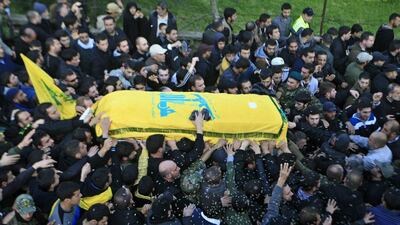The Israeli attack that killed several Hizbollah members and a top Iranian Revolutionary Guard commander, Mohammed Allahdadi, near the Syrian town of Quneitra last weekend had many people speculating about how Hizbollah might retaliate. However, the party’s options remain very limited.
Attention has focused on one of the victims: Jihad Mugniyeh, the son of top military commander, Imad, who was assassinated in Damascus in 2008. Allahdadi was the bigger fish despite some suggestions that Jihad, 25, oversaw Hizbollah’s operations on the Golan Heights, Syrian territory occupied by Israel in the Arab-Israeli war of 1967.
There is nothing to confirm that the group intended to target Israelis, though there have been bomb attacks against Israeli positions on the Golan in the past. In March 2014, four Israeli soldiers were injured in an attack near the demilitarised zone. And last June, an Israeli teenager was killed in a mortar attack on a car, which Israel said was a targeted attack.
It is not clear if Jihad Mughniyeh’s convoy was hit by a helicopter or a drone. Initial Israeli statements did not indicate a targeted killing, and a source later said that the Israelis mistakenly thought the group comprised low-level guerrillas.
The Syrian media has stated that the Hizbollah members were fighting jihadists in Syria. That’s not surprising, since neither Hizbollah nor Syria has ever admitted that the party is operating against Israelis from the Golan. Indeed, in an interview last week Hizbollah’s secretary general, Hassan Nasrallah, strongly denied it.
But it would not be surprising if Jihad Mughniyeh and his comrades planned a military move against Israel. There are three reasons for this. First, Hizbollah seeks to maintain its deterrence capability vis-à-vis Israel to show that it can respond to any Israeli attack against Iran’s nuclear programme. Second, Hizbollah needs to underline that its involvement in Syria has not affected its ability to fight against Israel. Mr Nasrallah made that point in his interview. And third, Hizbollah has long tried to link its attacks against Israeli forces in Lebanon’s Shebaa Farms area to the Golan. The areas abut each other and both the party and Syria have an interest in tying the two together: the Syrians, to benefit from the military leverage Hizbollah gives them over Israel; Hizbollah, to keep the Shebaa front open indefinitely by linking it to the broader question of Israeli occupation of Arab lands.
Even so, after the summer 2006 war against Israel, Hizbollah was forced to sharply reduce its attacks in the Shebaa Farms area. The presence of a reinforced United Nations force in southern Lebanon partly hindered its actions. There were other reasons that made it difficult to carry out “resistance actions”: domestic divisions in Lebanon, the end of a Syrian presence that had protected Hizbollah’s autonomy, and Shia fatigue.
Mr Nasrallah’s denials aside, when the war in Syria began in 2011, Hizbollah saw a chance to reopen a front with Israel, compensating for its relative inactivity in the Shebaa Farms.
Yet Hizbollah had to be careful, even as it became evident that it had opened a new front. Both the party and the Assad regime sought to retain a degree of deniability for actions against Israel, maintaining ambiguity so that they could blame incidents on the generalised chaos in the border area. The ambiguity suited Hizbollah in another way too. It has long portrayed itself as a Lebanese national resistance force and could not be seen to have become a regional mercenary for Iran.
As for the Syrians, they didn’t wish to highlight Hizbollah’s role in the Golan because the Syrian regime itself has almost never used force to regain occupied land. Damascus only agreed to this after Syria descended into civil war and Bashar Al Assad felt that it would help his political survival if he showed Israel that his regime alone could stabilise the border area.
The results of this policy of deliberate obfuscation are evident: Hizbollah has found it difficult to advance a strategy that reaffirms its deterrence equation with Israel even as it has been deeply involved in fighting Mr Al Assad’s enemies inside Syria. Despite Mr Nasrallah’s claims that Hizbollah can fight on multiple fronts, the party is stretched to the limits, and the Israelis know this.
It was partly to dispel that impression that Hizbollah decided to open the Golan front. It was able to portray its Syrian campaign as adding a new dimension to its confrontation with Israel, while also isolating Lebanon from Israeli retaliation.
But if that logic holds, the party will have limited latitude to retaliate from the traditional fronts for last weekend’s attack. To spare Lebanon Israeli retribution, it will hesitate to do so from Lebanese territory. And because it has not acknowledged that its members were plotting against Israel from the Golan, it may also refrain from responding from there.
That only leaves an attack against Israelis overseas. But with the world now focused on fighting terrorism, and Hizbollah and Iran purporting to be on the right side of that battle, how probable is that? Jihad Mugniyeh’s death, like that of his father, may be followed more by a whimper than a bang.
Michael Young is opinion editor of The Daily Star newspaper in Beirut
On Twitter: @BeirutCalling


